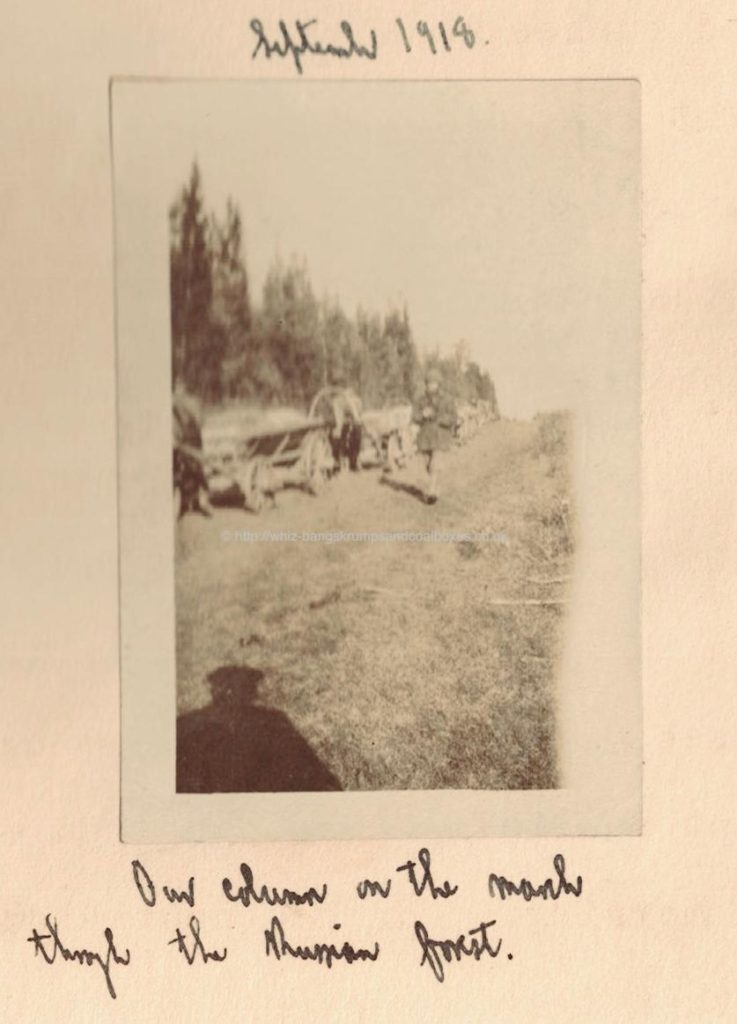Monthly Archives: September 2018
10th September 1918 Tuesday
Captain Page’s Hospital and a Returned Machine Gun
All material produced or reproduced here and throughout this work is the sole copyright of the author and the family of Doctor D.C.M. Page MC.
“It was again warm and sunny on Tuesday, September 10th. In the house next door to the doctor’s place I established a small hospital. It had been used for Bolshevik sick, and was in a filthy condition. There were six rooms in the house, with six iron beds, and mattresses, which were full of dirt, and bugs.
I had a walk around the village in the afternoon, and got a splendid view from the top of the small hill behind the village. All around me I could see nothing but miles and miles of forest. There were many women working in the fields reaping the crops in good old-fashioned style.
I got a message from Capt. Daw. R.A.M.C. to say that he was stationed at Siskoe for the purpose of evacuating any wounded or sick to Archangel by boat. We heard that 2/Lt. Heath of the 2/10th Royal Scots had arrived there too to act as Commandant of the place.
Capt. Norman left us in the evening for Yemetskoe en route for ‘C’ Force once more.
During the day one of the villagers bought in one of the Royal Scots’ Lewis guns, which the Bolsheviks had forgotten to take with them.”
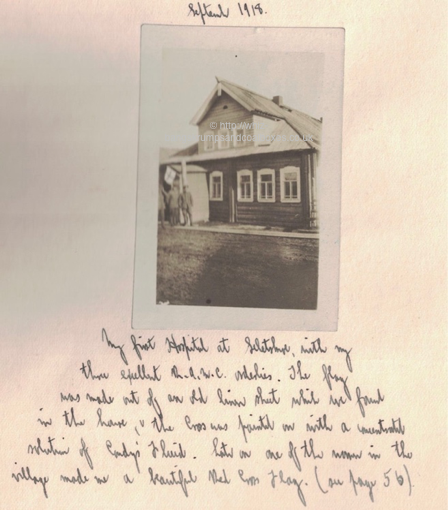
My first hospital at Seletskoe, with my three excellent R.A.M.C. orderlies. The flag was made out of an old linen sheet which we found in the house, and the cross was painted on with a concentrated solution of Condy’s Fluid. Later on one of the women in the village made us a beautiful Red Cross flag.
Condy’s Fluid was a purple liquid patented by Henry Bollmann Condy in 1857. It had a multitude of uses. Taken internally it could prevent or treat scarlet fever, but used externally it could disinfect water and be used as what we would call today an air freshener.
Find out about our connection with Dr Page and an introduction to his diary here
9th September 1918 Monday
A Trail of Rape, Pillage and Murder
All material produced or reproduced here and throughout this work is the sole copyright of the author and the family of Doctor D.C.M. Page MC.
“Monday September 9th, was another, bright sunny day. We were up early again, and moved off about 9 o’clock for Seletskoe. Lt Anderson with his platoon went on ahead. I went along with the main column. At the Obozerskaya road-junction we left a small out-post of Russians. The Bolsheviks had attempted to destroy the large, substantial, wooden bridge across the River Teogra, but hadn’t made much impression on it.
We entered Seletskoe (pronounced Seltsoe) about noon. Everywhere we saw signs of the recent Bolshevik occupation – windows smashed, and the interiors of houses wrecked. The villagers were overjoyed to see us, and gave us a hearty welcome. The Mayor told us that a French officer, belonging to Col. Haselden’s force, whom the Bolsheviks had taken prisoner, had been horribly mutilated by them. They cut off his ears, and nose, gouged out his eyes, and cut out his tongue, leaving him to die by the road-side. He was buried by the village priest, and for doing this the unfortunate priest was shot by the murderous villains. Nearly all the women in the village had been violated by these brutes, who also carried off with them the wife, and two young daughters of the village post-master. All food and money, and many cows, sheep and hens had been stolen, and the church broken into and robbed of its valuables.
We heard that Col. Haselden with his little force had arrived safely at Kholmogorskaya on the railway, after a most trying time in the forest.
Inside the little chapel in the churchyard we found two dead Bolsheviks. They had been wounded, and were absolutely naked. We buried them rather unceremoniously in the church-yard.
Some of the villagers told us that they had seen the Bolsheviks bring five British prisoners into the village a few days ago, and that the Bolsheviks had taken them into the forest one day, and had come back without them, but carrying their clothes. We could find no trace of them anywhere.
Capt. Shevtoff’s men were on outpost duty outside the village, and brought in two Bolshevik prisoners in the afternoon. They were pitiful objects – pale, thin and unshaven. They were only boys, and looked half-starved. Their clothes were ragged and torn. They wore no socks, and their boots were full of holes. They told us that they had got lost in the forest, and had been wandering about for days without food, and that the Bolsheviks opposite us numbered twelve hundred. They broke down completely after Capt. Shevtoff’s examination and wept like children. They said that they didn’t know why they were fighting against us, and blessed us for saving them.
The Bolsheviks left stacks of propaganda papers in all the houses printed in English and French, urging our troops not to fight against them, but to return to their homes and leave Russia to manage for herself. Russia for the Russians!
Seletskoe was a long, straggling village of three thousand inhabitants, with a large expanse of fertile land all around, and the River Entsa forming the eastern boundary. We occupied the second flat of a large house, and were very comfortable. I discovered the local doctor’s house which contained an excellent surgery and dispensary. But the Bolsheviks had destroyed many of the drugs and instruments. I was told that the local doctor had gone to Archangel about a month ago with four thousand roubles belonging to the village, with which to purchase drugs etc., but had not been heard of since! However, I saw his assistant – unqualified – and got his permission to use the drugs in the dispensary.
In the evening our cavalry arrived – some twelve or fourteen Russians but no horses! The Russian officer in charge was a queer-looking fellow, with red breeches, a Norfolk jacket, big top-boots, and huge spurs!
Whilst we were at supper a weeping woman came in to tell us that the Bolsheviks had stolen everything from her, including a cow. She wanted us to give her another cow there and then! Poor old Capt. Scott had a lot of this sort of thing to deal with, and it took us a long time to impress upon the ignorant people that we were not a travelling ‘Harrods Stores’!”
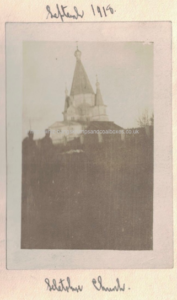
Find out about our connection with Dr Page and an introduction to his diary here
8th September 1918 Sunday
Red Army v. Red Bugs
All material produced or reproduced here and throughout this work is the sole copyright of the author and the family of Doctor D.C.M. Page MC.
“Next day – Sunday September 8th – we were up early, and moved off shortly after 8 a.m. It was a rag-time cavalcade – Royal Scots, French and Russians with over fifty carts, and the two guns bringing up the rear. Some of the horses pulling the guns were mounted by women! The road was hilly, and at some parts we had difficulty with the guns. There was dense forest on each side of the road all the way, Capt. Scott passed us in a swift drosky, and with four mounted White Guards riding behind – the General’s escort!
We eventually reached Teogra about midday. Teogra consisted of a group of three small villages of the usual type, and about a verst apart. The centre village contained the church. With the French we occupied the most southerly village – that nearest the enemy! – whilst the Russians and artillery remained in the centre one. The Bolsheviks had dug a series of shallow trenches just outside the centre village. They had evidently decided to make a stand, but got the ‘wind up’ when they heard of the Allied victory at Obozerskaya.
Capt. Du Pay went off on his own in the afternoon to Seleskoe, and sent back a message in the evening to the effect that he had reached that place, and could find no signs of the Bolsheviks at all. One of our planes flew over too, and reported one enemy cart entering Seleskoe. This was Capt. Du Pay! What if the aviator had dropped a bomb on him!
All the houses in Teogra had been looted by the enemy before they left, and all food stolen from the poor peasants. We billeted ourselves in an empty house, which was in a filthy condition, and full of bugs – great, big red fellows. And they didn’t forget us at night either!
I took a walk along the river bank in the afternoon. Quite a considerable area of country around Teogra was under cultivation, and in the warm sunshine everything looked very nice.”
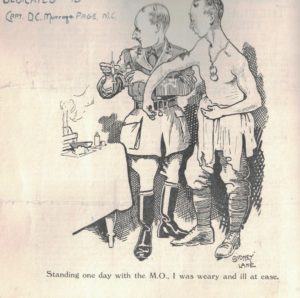
Find out about our connection with Dr Page and an introduction to his diary here
7th September 1918 Sunday
More Biting Insects, Tartan Trews and the tragic loss of a hero
All material produced or reproduced here and throughout this work is the sole copyright of the author and the family of Doctor D.C.M. Page MC.
“Saturday, the seventh, was another wet day. I saw a lot of sick of all nationalities in the morning, including a Russian girl with toothache. I couldn’t extract the offending molar as I had no forceps, but I painted the gum with iodine, and she went away quite happy. I wired the A.D.M.S. to send me up Nos. 1 and 2 Field Medical Panniers urgently.
In the forenoon Capt. Merchant went up with his men to relieve Lt. Anderson and party, who returned at dusk utterly fagged out.
I was bitten a lot by the wood-bug, which is an essential inhabitant of every Russian house.
During the day one of the Royal Scots, who got lost the other day, turned up. He was very much worn out, as he had been wandering about in the forest, and marshes for three days without food or shelter. He could tell us nothing about the fate of the other five men. I took him into hospital for a rest.
Then three French soldiers arrived from Col. Haselden’s force. They told us that the little force had become so hard pressed by the Bolsheviks that Col. Hasleden had to give the order to abandon everything, and take to the forest. Two drosky drivers also arrived from the same force.
Later on in the day a girl came in from Teogra. She belonged to this village, and had been captured by the Bolsheviks ten days ago, whilst out in the fields with her cows. The Bolsheviks killed, and ate the cows, and ill-treated the girl. She had very few clothes on, and had escaped through the forest, and marshes without shoes or stockings on.
Capt. Norman, Royal Engineers, arrived in the afternoon from Beresniki. He told us of the death of Lt. Main, 2/10th Royal Scots, who was drowned in the Dwina a few days ago. He slipped off a narrow gangway connecting a boat with the shore, and instantly disappeared in the swift-flowing stream. As it was a particularly dark night, all search for his body proved fruitless. He was one of the best, and we were all very sorry to hear of his sad end.
Our two 18-pounder guns arrived in the evening with Rusky crews, and in charge of two Russian officers, and two British sergeants. Each gun was drawn by eight small horses, and umpteen carts came behind with ammunition. The villagers, who had never seen a gun before, turned out en masse to witness the great event.
Lt. Anderson created a bit of a sensation too by turning out in tartan trews and glengarry!
About seven o’clock in the evening we had a message from Capt. Merchant to say that his patrols had found the village of Teogra unoccupied by the Bolsheviks. Capts. Scott and Norman went forward to investigate matters. Meanwhile we got ready to move forward when required. Capt. Scott got back about midnight with the news that we were to stay overnight in Vymuga, as one of the bridges on the road to Teogra was damaged.”
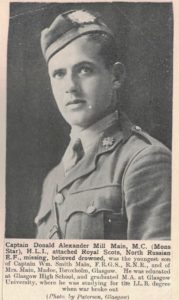
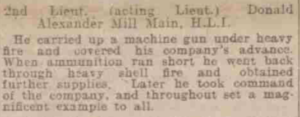
Daily Record – Thursday 19 July 1917 Image © Trinity Mirror. Image created courtesy of THE BRITISH LIBRARY BOARD. https://www.britishnewspaperarchive.co.uk
Find out about our connection with Dr Page and an introduction to his diary here
6th September 1918 Friday
A Russian Bath, Rumour, Theft and Discontent
All material produced or reproduced here and throughout this work is the sole copyright of the author and the family of Doctor D.C.M. Page MC.
“Friday the sixth was a cold, wet day. I had quite a big sick parade in the morning, mostly chills and rheumatic pains after the exposure of the last few days. One of the marines dislocated his left shoulder, whilst carrying an ammunition box. I got it back all right after a little manipulation. I also attended to a few Russian civilian sick and had a look round the village – a long, straggling line of about fifty houses.
Of course they were all built of wood, the better class ones being painted yellow outside. There was the usual white, gold and green church with domed tower containing a peal of bells. The inhabitants were very friendly towards us, but the village, besides its own population, contained about three hundred refugees – mostly able-bodied men – from the surrounding districts. These people came to us asking for food, and we promised to help the as soon as more supplies came up from Siskoe. There was a civil telegraph line from here to Siskoe, and Capt. Scott wired for more supplies to be sent up.
I indulged in a Russian bath in the afternoon, and enjoyed it immensely. It was a great stunt. The bath-house was a little wooden hut behind my billet, heated up by a charcoal stove. In order to get up a good heat one threw water on the red-hot charcoal. At one side of the hut was a wooden platform arrangement arranged in tiers, and the higher one mounted the hotter the atmosphere became. It fairly made me sweat, and I was as limp as a wet rag after it all.
Capt. Scott got a telegram from G.H.Q. to say that we were now known as ‘D. Force’. We also heard that several British, American, Italian, French and Japanese troops had arrived at Archangel. Oh, those rumours! If they were only true! We also heard that a force was pushing along from Obozerskaya to meet us.
At night two thousand rations arrived in charge of one wretched blue-jacket! He informed us that the drosky drivers had looted a lot of the stores en route. The dirty dogs!
Some of our noble band of White Guards left us during the day They said that they were ‘fed-up’ and wanted to get back to their homes! What about ourselves! That’s just the Russian all over. He is a lazy, good-for-nothing individual, who wants us to feed him, and save him from his enemy, the wily Bolshevik.”
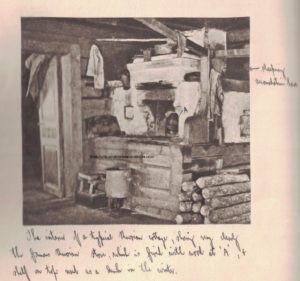
The interior of a typical Russian cottage, showing very clearly the famous Russian stove, which is fired with wood at ‘A’ and shelf on top used as a bunker in the winter.
Find out about our connection with Dr Page and an introduction to his diary here
5th September 1918 Thursday
A Damp Start, Aeroplanes Buzzing and a Cheery Finish to the Day
All material produced or reproduced here and throughout this work is the sole copyright of the author and the family of Doctor D.C.M. Page MC.
“At dawn on Thursday the fifth I attempted to light a fire, but failed hopelessly, as all the wood I could find was soaking wet. However, one of the drosky drivers came to my aid, and we soon had a fine fire blazing away. How did he do it? He simply felled a tree, and started the fire with dry, tarry splinters from the interior of the tree-trunk. Quite simple! It rained heavily all day up till about 4 p.m. when it cleared up, and was a fine sunny evening. We all felt very stiff, and sore, and our tempers weren’t of the best – at least not till we had had a tot of rum! The men were in a bad state too – soaked to the skin, and very dejected. I sent two of them into Vymuga. They were in an hysterical condition.
Capt. Merchant came back with his men in the afternoon, after Lt. Anderson and his platoon had gone up to relieve him.
Capt. Scott very wisely, and much to my relief, decided to establish his Headquarters at Vymuga for the time being, so we all trekked back there about 5 o’clock in the evening, leaving a French machine-gun detachment of two guns behind. We were all glad to get back to shelter, and have a chance of drying ourselves, and getting a wash. I managed to get a very comfortable room in the same house as my little hospital.
One of our aeroplanes from the Russian aerodrome on the island at Siskoe flew over Teogra in the evening, and on the way home dropped us a message to the effect that very few Bolsheviks could be seen in or near Teogra, and that the enemy had moved his guns from Teogra to Seletskoe. Looks as if he were going to ‘buzz off’ altogether. The message also told us of the British capture of Lens with 10,000 Hun prisoners, and of the capture of Obozerskaya on the railway by Col. Guard with 200 prisoners. This last item explains the Bolshevik retreat on Seletskoe. The good news cheered us all up immensely.”
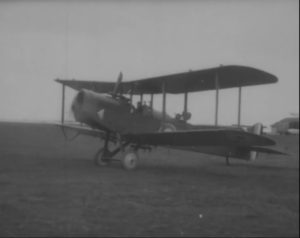
Airco DH 4 about to take off near Archangel. Used in bombing and reconnaissance
Find out about our connection with Dr Page and an introduction to his diary here
4th September 1918 Wednesday
Russians treated (one with rum!) and sent to Vymuga
All material produced or reproduced here and throughout this work is the sole copyright of the author and the family of Doctor D.C.M. Page MC.
“I was called out at 5 o’clock next morning – Wednesday September 4th – to attend to a wounded Russian. He was shot through the left upper arm – the bullet having come out behind the left shoulder. He had been shot at close range, as his tunic, and the skin around the wound were burned. It may have been self-inflicted, but no report came down with him, so after dressing him up, I sent him off to Vymuga in a drosky. It was a nasty cold, raw morning, and I soon had a roaring fire going.
Capt. Merchant with his marines went up to relieve Lt. Anderson’s party who returned about one o’clock. The men looked rotten, and some of them were absolutely ‘all-in’. I took care of two of the worst cases in my Aid Post – a cosy little bivouac which I had got the drosky drivers to put up in the forenoon. These boys – they were scarcely nineteen – could scarcely stand and were in a state of utter collapse.
In the forenoon I had a long chat with one of the French Officers, an excellent young chap – Lt. B……….. , who was horribly ‘fed-up’ with the whole business. And no wonder! For here we are, a miserable little force, hopelessly outnumbered (five to one) by the enemy, and up against an enemy who knows the country well, has guns, cavalry and telephones, whereas we have none of these necessities. What a game it is! The French Officer said:- ‘C’est très comique, mais très triste aussi’! Most of the Bolsheviks up against us here are criminals, who were released from the convict settlements at the time of the Revolution. They are led by a Hun Officer, and a Russian peasant told us that they had four field guns.
In the afternoon I rode into Vymuga in a drosky to see about establishing a small hospital there. I selected our old billet for the purpose. There were three very clean and comfortable rooms upstairs, and the old lady of the house was a decent old sort. I put Pte. Turner, R.A.M.C. in charge.
It started to rain heavily about three o’clock, and I had a very unpleasant ride back to camp. It rained all night, and I don’t think anybody got any sleep, except Lt. Anderson, who somehow or other managed to hit upon the only dry spot in our rickety bivouac. I was absolutely soaked through, and felt utterly miserable.
About midnight I was called out to see a Russian soldier who had been sent down from the out-posts. He was suffering from extreme exhaustion, and was a very sorry sight. I gave him a good ‘tot’ of rum, and sent him on to Vymuga.”
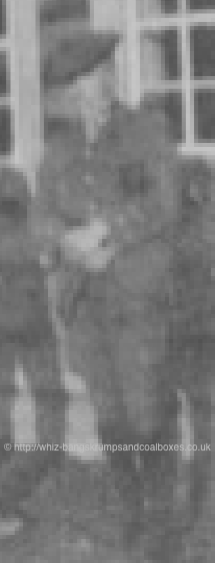
Lt Anderson (diary)
Find out about our connection with Dr Page and an introduction to his diary here
3rd September 1918 Tuesday
Don’t Panic! Don’t Panic! Mosquito Attack and a Missing Party
All material produced or reproduced here and throughout this work is the sole copyright of the author and the family of Doctor D.C.M. Page MC.
“I was up again about 7 o’clock, and we moved off once more at 9 o’clock towards Teogra. Pte. Turner, R.A.M.C. arrived with the Marines last night and I left him behind at Vymuga to look after the fifty odd marines left in the village. We established our headquarters about four versts out from Vymuga on the edge of a marsh. Lt. Anderson went forward with his platoon to get in touch with the enemy, and we had a message from him in the afternoon to say that he had come into contact with the Bolsheviks at a river crossing near Teogra and had exchanged a few shots. I heard the firing. One of the Russian (Allies) planes from Siskoe flew over in the afternoon and dropped three bombs on Teogra. During the day we heard a lot of artillery fire from the direction of Obozerskaya on the railway where Col. Guard (A. Force) is supposed to be attacking the Bolsheviks. Some of the French machine-gunners went forward to assist Lt. Anderson, whilst the remainder took up a position overlooking the marsh. Capt. Shevtoff’s noble band was our body-guard! What hopes! During the afternoon Major Graham G.H.Q. Staff, arrived to discuss the situation with Capt. Scott. He had come up from Archangel in a motor launch, which went on fire at Siskoe, and burnt all his kit! He told us that two 18-pounder guns, and a bunch of Russian cavalry were on their way up to join us, and proposed that we attack and capture Teogra as soon as they arrived. We also heard (nobody knew where it came from!) that a party of Bolsheviks were coming down the river behind us to try and cut us off from the base at Siskoe. Capt. Scott warned the Marines at Vymuga to be on the alert, but nothing happened. We were constantly getting these panic rumours, and, in the end learned to ignore them entirely.
The mosquitoes were very troublesome, and I was bitten all over the hands, face and neck. One or two of the Royal Scots had nasty swollen arms, as the result of these pests, and after dressing their arms with lint soaked in a solution of corrosive sublimate, I sent them back to Vymuga to rest.
In the evening we had a message from Anderson to say that six of his men were missing. They had two Lewis guns with them. Whilst they were going along the road to take up a position they had been surprised by a party of some sixty Bolsheviks, and had taken to the forest, where they were at once lost. If the Bolsheviks get hold of them they shall have a pretty thin time. Anderson also stated that he had inflicted twelve casualties on the enemy.
Capt. Shevtoff’s party went up at night to repair the bridge across the river at the point where Lt. Anderson had taken up his position.
We had two mounted White Guards with us who acted as despatch riders. They proved to be most excellent fellows.
We got a fine log fire going, which cheered things up considerably. The drosky drivers felled whole trees for us, and chopped them up into logs. They knew the right kind of tree to fell, and used their axes in a wonderful way. They were rewarded with cigarettes. I built a small bivouac with two stretchers, and branches of fir tree, and with our feet to the fire Capts. Scott, Merchant and I slept soundly all night.”
Find out about our connection with Dr Page and an introduction to his diary here
2nd September 1918 Monday
Advance to Vymuga
All material produced or reproduced here and throughout this work is the sole copyright of the author and the family of Doctor D.C.M. Page MC.
“We were up early on Monday, September 2nd and left Monastir shortly after 8 a.m. for Vymuga. It was warm and sunny. Our transport now consisted of thirty carts, as our baggage and extra supplies came forward from Siskoe last night. We marched along through some very fine country, reaching Vymuga about 10.30 a.m. Capt. Shevtoff met us and reported all quiet. Just before entering the actual village of Vymuga we came to a river, across which there was no bridge, but only a rope ferry. Capt. Scott decided to leave his transport on the Siskoe side of the river in case the Bolsheviks chose to attack us in the night. We all – officers and men – got good billets in the village. I came across a British R.A.M.C. man – Pte. Woods – with the Russian troops here. He was originally with Capt. Leslie R.A.M.C., M.O. to B. Force, but was detailed to go with the Russians after Col. Haselden retreated from Seletskoe. Col. Haselden’s idea was to force his way along to Obozerskaya (on the railway), and he left the Russian detachment to guard his rear at the road-junction between Seletskoe and Teogra. But the Bolsheviks were too much for the Russians, so the latter retreated to Monastir, where we found them, and thus the Bolsheviks were able to get in behind ‘B’ Force, and make its position a critical one.
In the afternoon an aeroplane flew over, and dropped a message to say that nothing could be seen of ‘B’ Force, and that the Bolsheviks were digging trenches at Teogra, a village about five miles off. We wondered what had happened to Col. Haselden and his gallant, little band – whether he had been captured, or whether he had taken to the forest. Anderson went off in the afternoon with six of his men to arrest some Bolsheviks in a neighbouring hamlet. He returned about 5 o’clock with a dozen miserable-looking prisoners. They were sent off to Archangel via Siskoe later on, and a few days later we heard that our brilliant intelligence department had liberated them all! Just before dark Capt. Merchant went off with a party of thirty marines to take up a position about five versts beyond the village on the road to Teogra.
During the evening we had a visitor. He was Lt. Dimitroff, of the White Guards, and had ridden all the way from Yemetskoe to see us, and tell us that he would guard our left flank. Capt. Scott and he were soon out of sight behind a mass of maps, and sketches.
But we got the surprise of our lives about 11 p.m. when a French captain – Capt. Du Pay – marched into the room. He told us that he was in charge of a French machine-gun detachment of sixty men, and ten guns, and that he had also brought along with him a party of forty Marines (British). They had been sent in a great hurry from Beresniki – a place over a hundred miles higher up the Dwina from Siskoe to our relief, as it had been reported that we were just about to be annihilated! Poor old Capt. Du Pay was in a very bad temper, but soon cheered up after he had something to eat. I took on the job of getting the French and Marine transport across the river on the pontoon. It was a slow job, as only one cart could go on the raft at a time. There was a fine display of Aurora Borealis. I got to bed – a fine feather mattress on the floor – about 4 a.m. 3/9/18.”
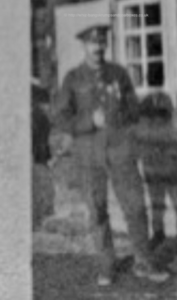
Captain Shevtoff of the White Guards (diary)
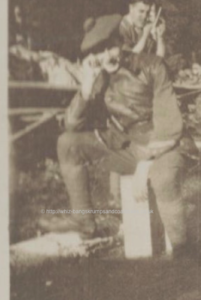
Captain Scott (diary)
Find out about our connection with Dr Page and an introduction to his diary here
1st September 1918 Sunday
Landing in Siskoe and a walk in the forest
All material produced or reproduced here and throughout this work is the sole copyright of the author and the family of Doctor D.C.M. Page MC.
“We were all up at daybreak on Sunday September 1st, and after a hurried breakfast of bully beef and biscuits, got men disembarked, and then landed all our stores – ammunition and food – on to a dozen Russian carts – quaint Heath-Robinson affairs drawn by sturdy, little ponies, and manned by all sorts of weird-looking men. The main village of Siskoe lay about a mile from the river, and by the time we had arrived in the place, the whole population – male and female – had turned out to look at us. They were a funny-looking crowd, and they swarmed round us when we halted in the middle of the village, asking for ‘seegarettes’ and ‘Tabac’. In one house we found an A.S.C. Corporal – in charge of Col. Haselden’s base – and from him we drew a quantity of supplies. Here also we came across an American sailor – a tall, lanky fellow – who had just arrived in Siskoe from Col. Haselden. He had come right through the Bolshevik lines, and had ridden, and walked seventy miles in the night. Meanwhile Capt. Scott had been indulging in a little recruiting (through the interpreter), and had got together a party of thirty-five Ruskies armed with rifles, who called themselves White Guards. Each had a dirty piece of white cloth tied round his left arm. They were a tough-looking crowd. We left Siskoe about 9 o’clock en route for Monastir. The Royal Scots led the way. Then came the marines, next the White Guards, and the rag-time transport brought up the rear. The road – a sandy track – took us through some lovely country. There was a dense forest on our right all the way, and on our left a swift-flowing river, and then a great lake with forest behind. The autumn tints on the trees and bushes were very pretty, some of the trees being bright, bright red, and others a beautiful yellow. I noticed a lot of heather, and blaeberries were plentiful. During a halt one of the drosky drivers picked me a cap-full of these berries, which had a delightful flavour. His joy was wonderful to behold when I rewarded him with a cigarette!
On reaching Monastir we were met by Capt. Shevtoff, and his three subalterns. They were all obviously relieved to see us. Another conference ensued! We questioned one of Capt. Shevtoff’s men, who had escaped from the Bolsheviks that morning. He had come about ten miles bare-footed, and told us that the Bolsheviks were about nine miles away, just beyond the village of Vymuga, and that they were in considerable force. The conference decided that Capt. Shevtoff’s party should go forward in the afternoon, and get in touch with the enemy, and that we would follow early tomorrow after a rest which we all badly needed.
After the usual army lunch Lt. Anderson and I had a look round Monastir and district, and found it to be a lovely spot. The village consisted of some twenty wooden houses, situated on the edge of a beautiful lake. On the opposite side of the lake was a huge monastery – all white, with green, and blue, and gold turrets and domes which glittered and glistened in the bright September sun. The clear reflection of this striking edifice in the smooth waters of the lake was wonderful. Anderson and I had a stroll round to the Monastery after tea. An old priest – the usual type with long hair and beard, and dirty mouldy-looking cassock – showed us around the place. It was a wonderful place inside. Huge, glittering chandeliers hung from the domed roof, beautiful paintings adorned the walls, and crosses etc. studded with precious stones were all over the place. It was a great sight. We saw the priests’ vestments, which were made of gold cloth, and decorated with jewels. Then the old priest showed us the small private chapel into which only the Czar, Czarina (alas! no more), and priests are allowed to enter. The kitchen of the Monastery fairly took my breath away. I never saw such a huge place in all my life before, and the monk-cooks in dirty, white cassocks looked like goblins. In the extensive, and well-kept gardens around the Monastery we noticed cabbages, potatoes, cucumbers, currants etc. The priest made us a present of a loaf of black, rye bread, and some butter. The bread was very heavy and sour, and the butter – well, it was lard! Regular pilgrimages are made to this Monastery at certain times of the year from all parts of Russia. There is accommodation for three hundred pilgrims in the huge place. At night we had patrols out all round the village.”
Douglas casually mentions meeting a corporal from the ASC. The ASC was the Army Service Corps. Later in 1918 it would become the Royal Army Service Corps. Today it has evolved into the Royal Logistics Corps. The ASC although one of the least spoken about was probably one of the British Army’s most important branches. Every major campaign, every war, every battle, the army has to be supplied with food, ammunition and every article for the day to day running of the complicated machine that makes up an army. Without the Army Service Corps or its equivalent today the rest of the army simply couldn’t function so whatever combat honours that were won by any particular regiment none of them could have done it without the support of the Army Service Corps.
Those of us of a certain age occasionally use the phrase “Heath Robinson” when referring to something that seems overly complicated for the task at hand. The phrase is defined in Chambers’ dictionary as Heath-Robinson: adj used to describe an over-ingenious, ridiculously complicated or elaborate mechanical contrivance. There can’t be many people whose surnames become adjectives. The phrase was in use by 1912 during his lifetime. He died in 1944.
Find out about our connection with Dr Page and an introduction to his diary here
